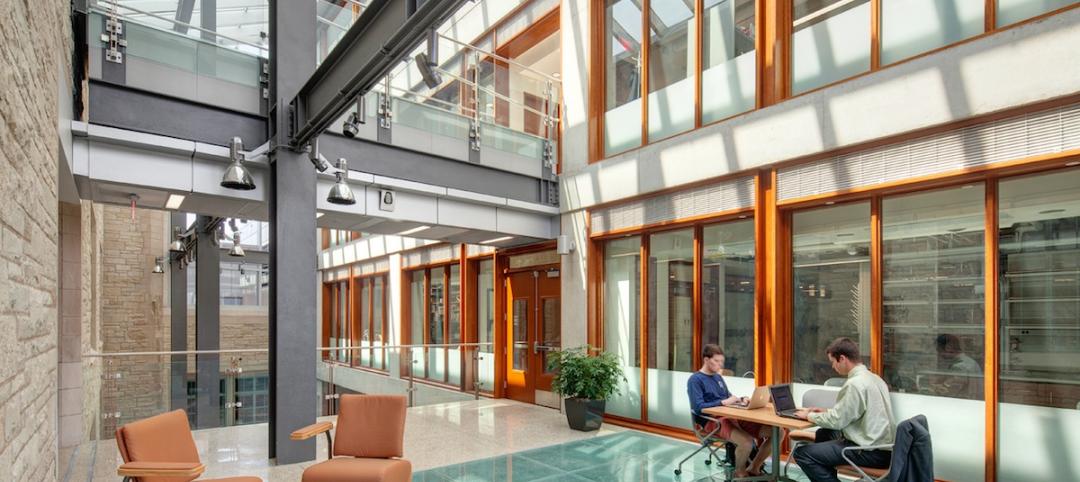It’s been a busy couple of months for the architecture and design firm NELSON. It was wrapping up its merger with Wakefield Beasley & Associates and WB Interiors, a deal that was announced last November. It recapitalized its business with two financial partners, H.I.G. Capital and Prudential. And today, NELSON announced that it had entered into a merger agreement with FRCH Design Worldwide, an architecture and design firm with three offices and 200-plus employees, which specializes in retail, hospitality, and mixed-use.
NELSON’s Chairman and CEO, John “Ozzie” Nelson Jr., and FRCH’s CEO, Jim Tippmann, will serve as Co-CEOs of the combined company, which now consists of 25 offices and more than 1,100 employees. FRCH Design Worldwide will be known as FRCH a NELSON company.
Tippmann tells BD+C that he and Nelson started talking “15-16 months ago” about the possibility of merging their two businesses. Such a deal made sense, explains Tippmann, because “we’re both operating in a dynamic, changing business environment.”
FRCH, with estimated revenue of $40 million, had concluded that it either had to acquire a company itself, or find a partner like NELSON that had the geographic reach FRCH needed in order to compete for business from larger clients, especially those propagating brands in multiple markets.
Just as the Wakefield Beasley deal got NELSON deeper into the mixed-use realm, merging with FRCH would bring into NELSON’s stable “a sizable hospitality business,” says Nelson. His company would also benefit from FRCH’s “big retail engine” in a sector where NELSON on its own has had difficulty gaining traction.

Jim Tippmann (left) and John “Ozzie” Nelson Jr., Co-CEOs of NELSON, will manage their company after the merger by region and practice sector. Image: NELSON
As Co-CEOs, Nelson and Tippmann have crafted a regionally defined operating model. Tippmann says he will be “the first point of contact” for NELSON’s business in the Northeast and Southeast, and Nelson will take the lead for its offices in the Midwest and West. Practice responsibilities will align with each of the merging company’s specialties: for example, Tippmann will oversee retail and “consumer interface” projects, whereas office, financial, and industrial projects will fall under Nelson’s domain.
The combined company’s holding company will continue to be based in Minnesota. But Cincinnati—FRCH’s headquarters city—is now NELSON’s biggest office. Atlanta is the company’s biggest market, and will be managed by two offices there. Over the coming months, the leadership of both organizations will further integrate their expanded service offering.
Nelson tells BD+C that he still sees his company as a “global boutique” with an office structure that Tippmann thinks is now “a contemporary model, where leaders can be anywhere in the U.S.” FRCH and NELSON both use video conferencing to connect their offices, which came in handy yesterday when the CEOs were announcing the merger to their employees via electronic town hall-like meetings. (Nelson notes that he spent 2½ hours with 250 people in his company’s Atlanta offices answering their questions. “You want to be as transparent as you can in those meetings,” he says.)
“I couldn’t have been more pleased with how this came together,” says Tippmann.
Nelson says his company has gotten to a size where “we will have an opportunity to grow organically and attract talent.”
However, having been involved in 40 mergers during his 30-year career with the company, Nelson says he’s still on the lookout for acquisition candidates in Southern California and Texas, and for firms that would strengthen NELSON’s competitive position in such sectors as industrial architecture and healthcare.
What he will avoid, though, is finalizing a merger just to get it done. “Culture trumps everything, and you don’t want to do a deal that leaves you with an operating nightmare.”
Related Stories
| May 3, 2014
Health system capital planning for the future: The benefits of master plan portfolio analysis and ambulatory market modeling
Money continues to be scarce, yet U.S. health systems need to invest and re-invest in their physical future. Healthcare facilities planning experts from CBRE Healthcare outline tools and strategies for identifying where to best allocate precious resources.
| May 3, 2014
4 easy steps to being a great project manager
Managing a team of people, especially creative people, is a task that not everyone is up for. Keeping your team on the same page while maintaining a schedule and budget that can keep your corporation happy will take confidence and bountiful people skills. Here are some tips for effectively managing a project. SPONSORED CONTENT
Sponsored | | May 3, 2014
Fire-rated glass floor system captures light in science and engineering infill
In implementing Northwestern University’s Engineering Life Sciences infill design, Flad Architects faced the challenge of ensuring adequate, balanced light given the adjacent, existing building wings. To allow for light penetration from the fifth floor to the ground floor, the design team desired a large, central atrium. One potential setback with drawing light through the atrium was meeting fire and life safety codes.
| May 2, 2014
World's largest outdoor chandelier tops reworked streetscape for Cleveland's PlayhouseSquare
Streetscape project includes monumental gateway portals, LED signage, and a new plaza, fire pit, sidewalk café, and alfresco dining area.
| May 2, 2014
Norwegian modular project set to be world's tallest timber-frame apartment building [slideshow]
A 14-story luxury apartment block in central Bergen, Norway, will be the world's tallest timber-framed multifamily project, at 49 meters (160 feet).
| May 2, 2014
Top 10 countries for LEED buildings outside the U.S.
The list of the top 10 countries for LEED reflects the global adaptability of the world’s most widely used and recognized system guiding the design, construction, operations and maintenance of green buildings.
| May 1, 2014
First look: Cal State San Marcos's posh student union complex
The new 89,000-sf University Student Union at CSUSM features a massive, open-air amphitheater, student activity center with a game lounge, rooftop garden and patio, and ballroom space.
| May 1, 2014
Super BIM: 7 award-winning BIM/VDC-driven projects
Thom Mayne's Perot Museum of Nature and Science and Anaheim's new intermodal center are among the 2014 AIA TAP BIM Award winners.
| May 1, 2014
Tight on space for multifamily? Check out this modular kitchen tower
The Clei Ecooking kitchen, recently rolled out at Milan's Salone de Mobile furniture fair, squeezes multiple appliances into a tiny footprint.
| May 1, 2014
Chinese spec 'world's fastest' elevators for supertall project
Hitachi Elevator Co. will build and install 95 elevators—including two that the manufacturer labels as the "world's fastest"—for the Kohn Pedersen Fox-designed Guangzhou CTF Finance Center.

















